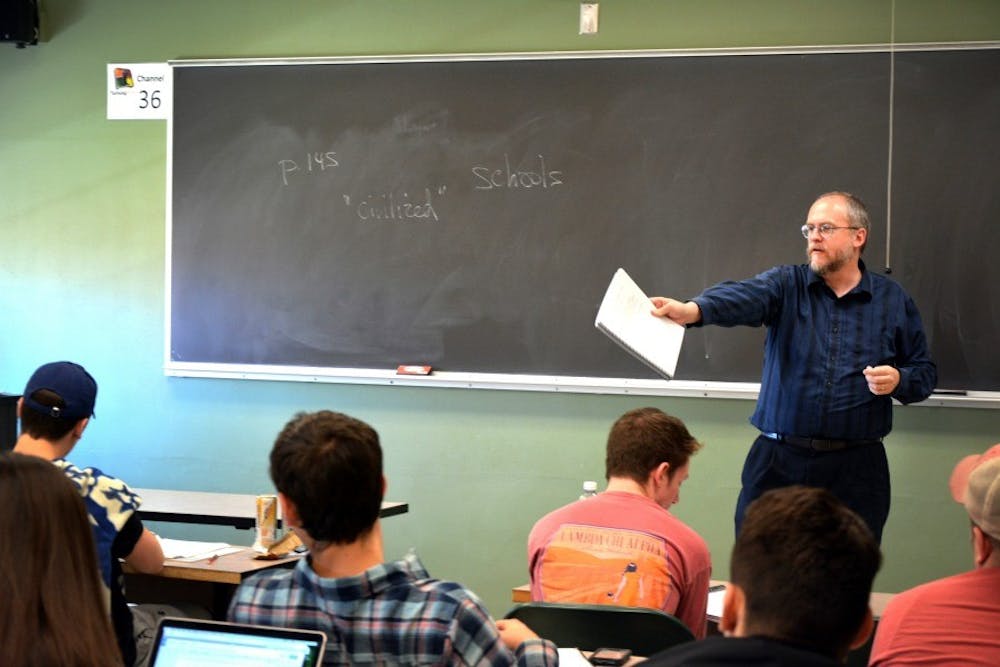Last Friday, an article in this newspaper reported extensively on the administration's dependence on contingent faculty. A great number of professors spoke on behalf of themselves and their overworked colleagues - that is, part-time faculty (or adjuncts), instructors and visiting assistant professors (VAPs).
To recap, in Megan Zahneis' article, John-Charles Duffy, the story's central figure, employed the proverbial hamster-wheel metaphor to allude to the endless cycle many of the aforementioned professors find themselves in. They are asked to play the game of academia, that is to say, they are asked to teach their courses - often three to four a semester - while simultaneously dealing with the uncertainty of their jobs, which are renewed on a yearly basis for up to five years, and attempting to offer some novel research to their field with the perilous hope that they will earn a position as a tenure-track professor.
There are two capital issues that stem from these circumstances. First, it is unjust for this group of professors to be asked all they are asked to do and, in return, earn salaries comparable to full-timers at McDonald's. We concede that the motivation for teaching students - for passing on the torch of knowledge to the incoming generation - should not be money. Incentive for instructing the youth lies within the action itself.
However, there comes a point when being overworked and underpaid is simply not worth the effort, especially when you are a professor as seemingly "dispensable" as the contingent faculty are. This, in turn, propagates bad morale and the belief that the professors are essentially worthless - a dime a dozen.
Furthermore, the responsibility of the school to educate students should encourage the administration to create the most conducive environment possible to fostering healthy relationships between students and professors. Clearly that environment is not being nurtured with the status quo.
In order to alleviate this stigma, the professors do what got them here in the first place - study. As stated, this is an attempt to earn a full-standing position at the university and earn tenure, which brings us to the second issue, one more pertinent to us, the students.
Whether their time is spent planning lectures, shuffling slides around, putting in research time, commuting or, gasp, sleeping, contingent faculty often have not the slightest iota of time to advise their students. Why, when there is so much else on the line, should a visiting assistant professor set up time to meet with students? For all they know, they could be gone by the end of the year.
As Gael Montgomery, VAP of Italian, puts it, "Everyone has to start, in theory, looking for another job even while they're doing a full-time job. Because you don't know if you'll have another job."
This uncertainty leaves students without a prospective mentor for the coming years, not to mention the students' resulting lack of trust in confiding in another faculty member.
Moreover, considering the bad morale among contingent faculty, it must come as a challenge to work up the confidence to even believe that they are qualified to advise students. The myriad pressures with which the contingent faculty deals on a day-to-day basis may seem inconsequential to us, as all we really need are good grades. Right?
Well, if all you aspire to do in life is scoot by - with passing grades, without making connections - then the state of many of your professors is indeed inconsequential. Who cares?
If, on the other hand, you feel as if you are missing out on the full Miami package - an attentive staff and helpful faculty included - then heed this call:
You, as the student body, should be aware of the reasons some of your professors may scarcely be available. You, as inquisitive students, should raise questions as to the methods of madness employed by the administration (i.e. hiring and firing contingent faculty). You, as an academically aspiring group, should seek out your professors on a more common basis and form relationships that go beyond simply student and teacher, but mentor and protégé.

